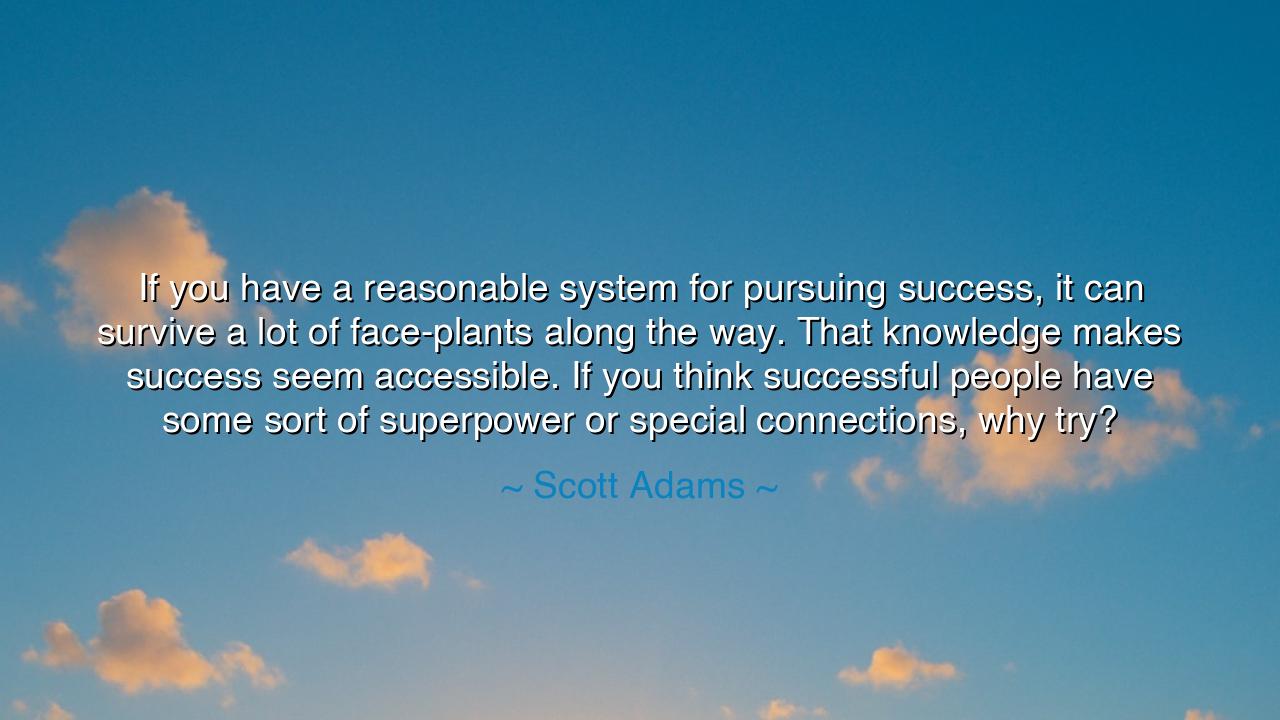
If you have a reasonable system for pursuing success, it can
If you have a reasonable system for pursuing success, it can survive a lot of face-plants along the way. That knowledge makes success seem accessible. If you think successful people have some sort of superpower or special connections, why try?






Hear, O seeker of wisdom and perseverance, the words of Scott Adams, the creator, thinker, and observer of human endeavor: “If you have a reasonable system for pursuing success, it can survive a lot of face-plants along the way. That knowledge makes success seem accessible. If you think successful people have some sort of superpower or special connections, why try?” In this saying lies not merely the philosophy of work, but the ancient rhythm of growth itself — the eternal truth that success is not a divine gift but a craft, shaped through persistence, systems, and faith in one’s own process.
The meaning of this quote is clear to the mind yet deep to the spirit. Adams speaks not of luck or destiny, but of systems — structured habits, repeatable actions, and deliberate processes that guide one through the chaos of life. For in a world where failure often feels final, he reminds us that the wise do not worship outcomes; they tend to systems that survive failure. A reasonable system, he says, can withstand “face-plants” — the humiliations, mistakes, and defeats that accompany every worthy pursuit. The man of systems is like a sailor who, though tossed by storm and wave, keeps his compass fixed; each fall becomes a lesson, not a ruin.
The origin of these words springs from Adams’s own philosophy of life, shared through his writings such as How to Fail at Almost Everything and Still Win Big. As the creator of Dilbert, he witnessed success not as a single stroke of genius but as the product of countless failures turned into insight. His “system” was persistence itself — learning from errors, adapting methods, and continuing the pursuit with faith that progress is not a miracle, but the result of discipline. His wisdom echoes that of the ancients: that success belongs not to the flawless, but to those who endure, adjust, and rise again with clarity of purpose.
History offers a vivid mirror to his teaching. Consider Thomas Edison, who, after thousands of failed attempts to invent the electric light, declared, “I have not failed; I’ve found ten thousand ways that won’t work.” Edison had a system: experiment, observe, adjust. He did not depend on divine favor or secret privilege. His “reasonable system” survived every failure because it was built not on perfection, but on the faith that effort refines itself through repetition. In this, Edison lived the truth Adams speaks — that the one who treats failure as data, not defeat, is the one whom fortune cannot crush.
In the ancient world, this truth was known under different names. The philosophers of Greece called it praxis, the habit of doing and refining through doing. The Stoics saw it as ataraxia, the calm persistence through adversity. The samurai of Japan spoke of kaizen, the art of continuous improvement. Across ages and empires, the wise have known that mastery is not born in a moment of triumph but forged through an unbroken series of recoveries. Thus, Adams’s “system” is not new — it is a modern echo of timeless discipline. It is the art of finding peace within imperfection and power within persistence.
The second half of his quote pierces even deeper: “If you think successful people have some sort of superpower or special connections, why try?” This is the lament of many souls who surrender before beginning. When we believe that success belongs only to the chosen few, we strip ourselves of agency. Adams rejects this illusion. He reminds us that success is accessible, not mystical. The moment one abandons the myth of “superhuman genius” and embraces the slow, structured, imperfect path, success ceases to be a mystery and becomes a craft. The gods of success are not divine; they are human beings who kept building after others stopped.
So, O listener, what lesson must you carry from this? It is this: build your system, and trust it more than your luck. Do not fear to stumble; design your path so that you can rise. Create routines that outlast moods, principles that endure mistakes, and habits that bring small victories each day. Let your system become your armor and your guide, for






AAdministratorAdministrator
Welcome, honored guests. Please leave a comment, we will respond soon